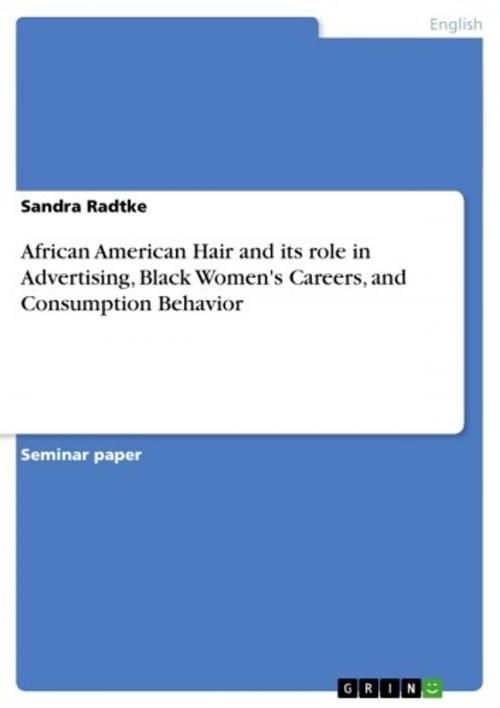African American Hair and its role in Advertising, Black Women's Careers, and Consumption Behavior
Nonfiction, Entertainment, Drama, Anthologies| Author: | Sandra Radtke | ISBN: | 9783638390453 |
| Publisher: | GRIN Publishing | Publication: | June 24, 2005 |
| Imprint: | GRIN Publishing | Language: | English |
| Author: | Sandra Radtke |
| ISBN: | 9783638390453 |
| Publisher: | GRIN Publishing |
| Publication: | June 24, 2005 |
| Imprint: | GRIN Publishing |
| Language: | English |
Seminar paper from the year 2003 in the subject American Studies - Culture and Applied Geography, grade: 1,2, Dresden Technical University, course: American Culture of Consumption, 5 entries in the bibliography, language: English, abstract: In this paper for the seminar 'The American Culture of Consumption', I want to deal with the complex topic of African American hair. In 1992, African Americans bought 34% of all sold hair care products in the United States. They spent thrice as much money on this than any other customer group. The majority of the purchased products were hair relaxers (Rooks, p.117). These are only figures, but they demonstrate how important hair is to African Americans. I want to explain the roots of this significance in the first chapter and show how the way hair was rated changed during the times of slavery. Then, I want to examine advertisements for black hair treatment products by white- and black-owned firms to find out whether they differ in their strategies and how strong their influence on the consumers was and still is. The third chapter will deal with hair dressing as a career choice. In conclusion, I would like to attempt to provide answers for the question why African Americans might feel the urge to change their hair's texture at all.
Seminar paper from the year 2003 in the subject American Studies - Culture and Applied Geography, grade: 1,2, Dresden Technical University, course: American Culture of Consumption, 5 entries in the bibliography, language: English, abstract: In this paper for the seminar 'The American Culture of Consumption', I want to deal with the complex topic of African American hair. In 1992, African Americans bought 34% of all sold hair care products in the United States. They spent thrice as much money on this than any other customer group. The majority of the purchased products were hair relaxers (Rooks, p.117). These are only figures, but they demonstrate how important hair is to African Americans. I want to explain the roots of this significance in the first chapter and show how the way hair was rated changed during the times of slavery. Then, I want to examine advertisements for black hair treatment products by white- and black-owned firms to find out whether they differ in their strategies and how strong their influence on the consumers was and still is. The third chapter will deal with hair dressing as a career choice. In conclusion, I would like to attempt to provide answers for the question why African Americans might feel the urge to change their hair's texture at all.















